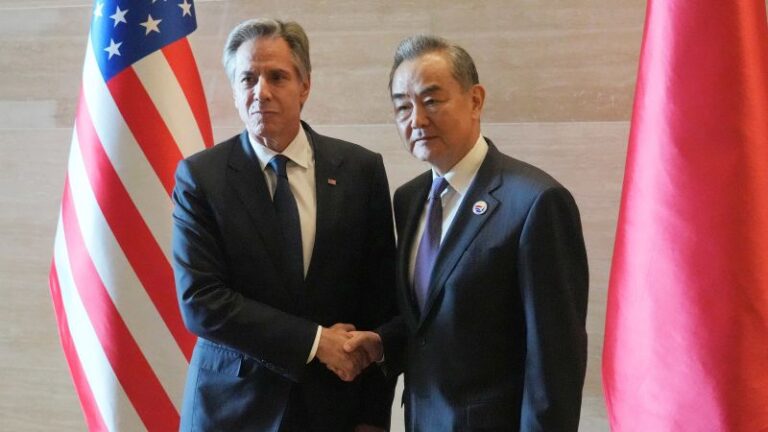Ahmad Ibrahim/AP
U.S. Secretary of State Antony Blinken shakes hands with his Chinese counterpart Wang Yi on the sidelines of the ASEAN foreign ministers’ meeting in Vientiane, Laos, July 27, 2024.
Hong Kong
CNN
—
U.S. Secretary of State Antony Blinken expressed concern about China’s “destabilizing actions” in the South China Sea during a meeting with Chinese leader Wang Yi, and the two countries sought to maintain communication amid the deepening standoff.
Blinken met Wang in Laos during a tour of Asia against the backdrop of a fierce U.S. presidential election campaign that has brought renewed regional attention to what the world would look like with a new administration in the White House.
State Department spokesman Matthew Miller said in a statement that the two leaders discussed bilateral, regional and global issues, adding that “the Secretary of State made clear that the United States remains committed to advancing its vision of a free and open Indo-Pacific, working with our allies and partners.”
During the meeting, Blinken also discussed China’s support for Russia’s defense industrial base, and warned that the United States would take “appropriate action” if China did not stop the support, Miller said.
A Chinese foreign ministry statement said Wang told Blinken that the United States had a “misconception of China” and urged him to return to a “rational and pragmatic China policy”, but added that the two sides would continue to communicate.
The first leg of Blinken’s week-long visit, which will see him visit Vietnam, Japan, the Philippines, Singapore and Mongolia, comes amid continued tensions between the two countries despite efforts by U.S. President Joe Biden’s administration to stabilize their fragile ties.
Russia’s aggression in Ukraine and China’s growing assertiveness in the South China Sea and threats to Taiwan have strained relations between Washington and Beijing in recent years.
This week, the North American Aerospace Defense Command intercepted two Russian and Chinese bombers flying near Alaska, U.S. defense officials said, marking the first time that aircraft from the two countries have been intercepted during a joint flight.
China’s continued support for Russia more than two years after Moscow’s invasion is an ongoing point of tension for the United States, its allies and Ukraine.
When NATO leaders met this month, a joint statement said China was a “decisive backer of Russia’s war against Ukraine” and was providing “significant support to Russia’s defence industrial base”.
The United States and the European Union have accused China of bolstering Russia’s defense sector with dual-use exports in recent months and have imposed sanctions on dozens of Hong Kong and mainland Chinese companies for evading broader measures imposed on Russia. Beijing denies supplying weapons and says it maintains strict controls over such products.
Beijing has sought to position itself as a neutral peace broker in the conflict, despite deepening political, economic and military ties with Moscow and a publicly cozy relationship between Chinese President Xi Jinping and Russian President Vladimir Putin.
Earlier this week, Wang told his visiting Ukrainian counterpart Dmytro Kuleba that Beijing “supports all efforts that contribute to peace,” marking the first time China has hosted a senior Ukrainian official since the Russian aggression began nearly two and a half years ago.
In contrast, Putin and Russia’s top diplomat, Sergei Lavrov, have been welcomed repeatedly in Beijing since the invasion.
Kuleba also visited Hong Kong, where he called on the government of the semi-autonomous Chinese city to stop Russia from using the Asian financial hub to evade Western sanctions.
Among the countries Blinken plans to visit are the Philippines and Japan, which have mutual defense treaties with the United States.
The Philippines has grown closer to the United States since the election of President Ferdinand Marcos Jr. amid escalating clashes between Manila and Beijing in the South China Sea.
Before his meeting with Wang on Saturday, U.S. Secretary of State Antony Blinken, in a meeting with ASEAN foreign ministers, urged Southeast Asian countries to work together to address challenges including China’s “escalating unlawful actions against the Philippines” in the South China Sea.
But he also praised diplomatic relations between Manila and Beijing over the contentious issue, noting that the Philippines on Saturday completed an unhindered resupply journey to troops stationed on a naval ship stranded on the hotly contested Second Thomas Shoal.
Such supply missions have been a source of tension between the Philippines and China for months, but the two countries reached a tentative agreement last week to facilitate the transfers.
“I am pleased to report today’s successful resupply of Second Thomas Shoal as a result of an agreement reached between the Philippines and China,” Blinken said.
“We applaud that and hope and expect that to continue in the future.”
Biden has pushed for deeper ties with the Philippines, Japan and another mutual treaty ally, South Korea, during his presidency, with Blinken at the forefront of his diplomatic efforts.
Beijing resents these efforts, which it sees as part of a U.S. campaign to contain China and contain its rise.
Asia is therefore watching closely to see what happens next, especially in light of the shocking developments in the recent US election campaign.
Republican candidate and former president Donald Trump, who recently survived an assassination attempt, has viewed Washington’s alliances in more transactional terms than Biden, and his running mate, J.D. Vance, has advocated halting military aid to Ukraine to focus on the defense of Taiwan.
Meanwhile, the Democratic race was thrown into turmoil after Biden decided not to seek reelection and Vice President Kamala Harris became the party’s presumptive nominee.

